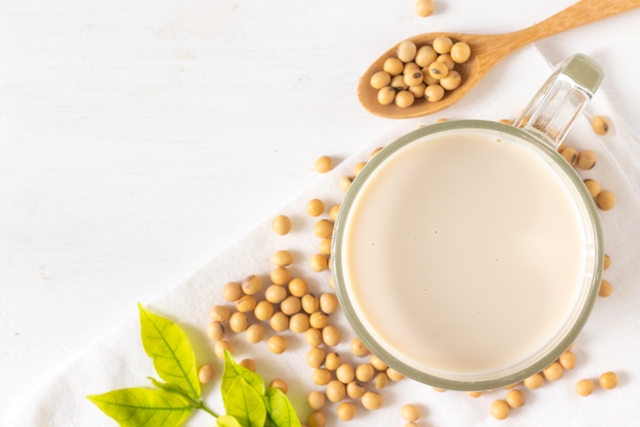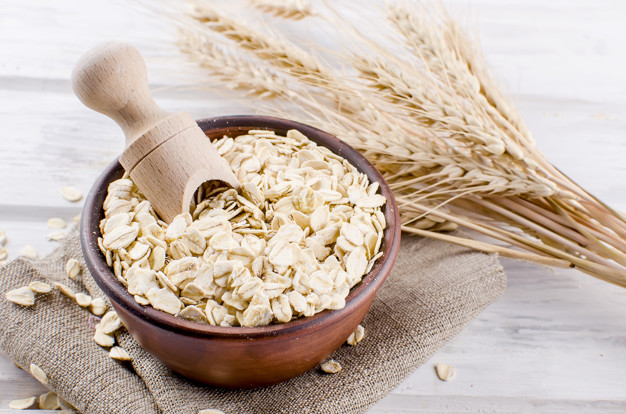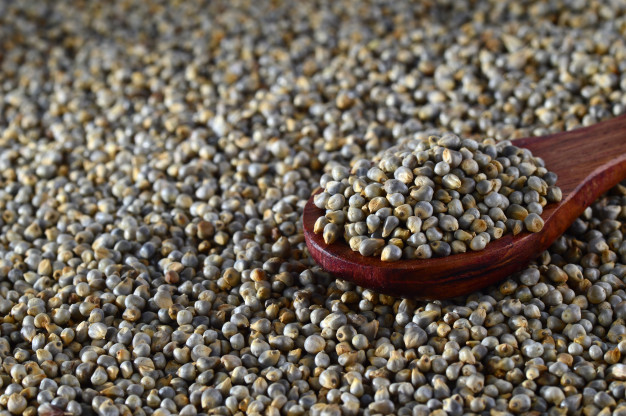Soymilk is a nutrient dense beverage prepared by mixing soybean with water. It has been traditionally used for several therapeutic purposes. It is also considered as one of the most effective dairy alternative for vegans and for those individual who suffer from lactose intolerance.
Nutritional profile
- It contains lesser amount of carbohydrate
- It contains fibre as well
- It is considered as a good source of protein. It is composed of various important amino acids and contains all nine essential amino acids
- It contains fat too. It contains both saturated and unsaturated fat but it is relatively higher in unsaturated fat. It is significantly rich in omega 3 fatty acids, which offer numerous health benefits
- It is packed with several important micronutrients like, Vitamin A, Vitamin K, Vitamin B1, B2, B3, B6, B9, choline, calcium, phosphorus, potassium, and iron
- It is also loaded with isoflavones, flavones, phytates, genistein and β-glucoside conjugate, which exhibit various nutraceutical activities
Biological activity
Antioxidant activity
Flavones, isoflavones and micronutrient components of soymilk exert strong antioxidant activity. It is responsible for decreasing oxidative stress by reducing the concentration of free radicals within body, which ultimately reduces the risk of developing chronic diseases
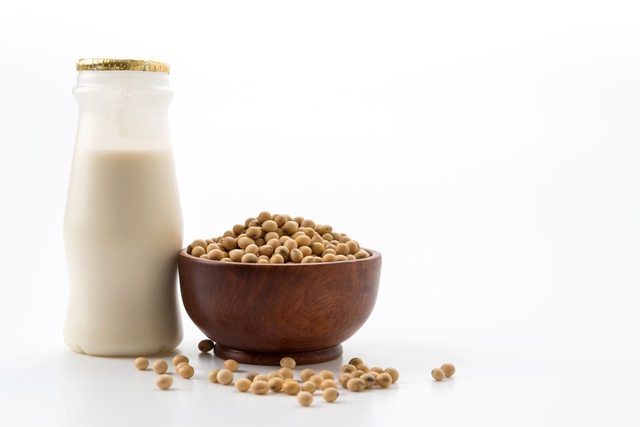

Anti-carcinogenic activity
Phytoestrogen components of soymilk help in exerting anti-carcinogenic activity, which is related with destroying malignant cells and also hinders their growth. It is very effective for decreasing the prevalence of breast and prostate cancer
Anti-inflammatory activity
Its anti-inflammatory activity is accountable for decreasing inflammation, swelling and pain
Health benefits
Role on immunity
- It contains several imperative nutrients that help in improving immunological responses of the body
- Its protein content is responsible for developing antibody or immunoglobulins that help to protect the body from harmful invaders
- It also helps in improving the resistance power of the body by enhancing the activity of immune cells. Its antioxidant activity is accountable for protecting these immune cells from damages as a result promotes their functionality
- It helps in stimulating the synthesis of WBC, which is also associated with strengthening the defense mechanism of body as it helps to fight against infections
Role on skeletal system
- Consumption of soymilk is very effective for strengthening the skeletal system
- Its calcium and phosphorus components play vital role in improving skeletal health as they are essentially required by the body for healthy bone formation
- It is also associated with improving bone mass, density and strength
- Its consumption is closely related with decreasing the prevalence of bone thinning as a result lowers the risk of fractures

Role on nervous system
- It plays significant role in improving the functionality of both central and peripheral nervous system
- Its Vitamin B6 component helps in promoting the activity of brain
- Its protein content is also responsible for promoting the growth and development of brain
- Its omega 3 fatty acid content is considered as another imperative component that acts as building block of the brain
- It helps to improve the functionality of nerve cells as well, which subsequently lowers the risk of developing neurological disorders
- It is very effective for decreasing the prevalence of Alzheimer’s diseases and dementia
- It helps to improve memory as well
- It also improves cognitive ability
Role on mental health
- Consumption of soymilk is very much useful for improving mental health status as it contains significant amount of B vitamins especially Vitamin B6, which play imperative role in boosting up the mood
- It is very effective for preventing depression. Its magnesium content is responsible for stimulating the release of serotonin hormone that acts as anti-depressant
- It helps to inhibit anxiety as well as stress

Role on blood vessels
- Soymilk plays important role in strengthening the integrity of blood vessels
- Phyto-antioxidant, omega 3 fatty acid and omega 6 fatty acid components of soymilk are responsible for protecting the blood vessels from hemorrhage. It has seen that all of these components bind with the lining of blood vessels and protect every cell of lining from damages
- It is also associated with preventing fat deposition within blood vessels as a result inhibits the hardening of blood vessels, which ultimately facilitates smooth blood circulation
- Moreover consumption of soymilk is extremely helpful for improving endothelial health and functionality
Role on skin
- Its protein content and micronutrient components play vital role in providing proper nourishment to the skin, which ultimately helps to make the skin healthy and supple
- Its consumption is closely relate with moisturizing the skin
- It helps to improve skin glow as well
- It helps to prevent ageing and protect the skin from oxidative damages
- It is extremely helpful for preventing hyper-pigmentation
- Whereas, it is also very effective for preventing acne
Role on hair
- It contains various imperative nutrients that promote hair growth
- It is associated with providing proper nourishment to the scalp, which also helps in promoting hair growth
- It helps to make the hair strong as well
- Its protein content plays vital role in preventing alopecia
- It also helps to improve hair shine and appearance

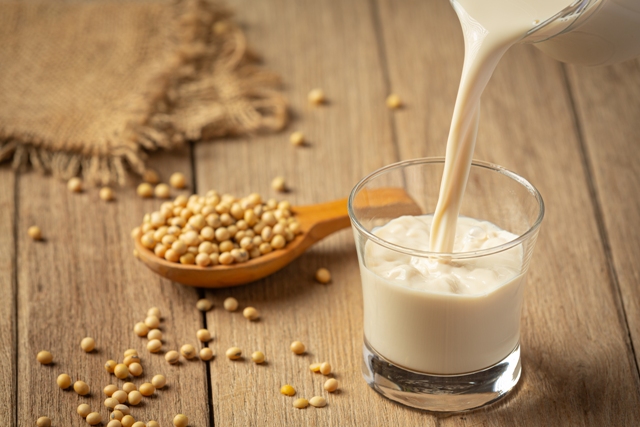
Therapeutic uses
It has been extensively used for various therapeutic purposes, like –
- It is widely used as an imperative therapeutic substance for cardiac health as it helps in decreasing the concentration of plasma lipid in body that ultimately lowers the risk of developing cardio vascular diseases
- It significantly decreases the prevalence of atherosclerosis by inhibiting plaque formation within blood vessels, which subsequently lowers the susceptibility of developing coronary artery diseases
- It helps to decrease the risk of heart attack and stroke
- Its polyunsaturated fatty acid components are also responsible for promoting cardiac health
- Its consumption helps in improving the level of HDL in body, which also provides a positive impact on cardiac health
- As it is related with decreasing blood cholesterol concentration like LDL, VLDL, triglyceride, thus its consumption is thought to be very effective for decreasing the prevalence of hypercholesterolemia and hepatic disorders
- It helps to maintain a healthy ratio of LDL and HDL in body that helps to improve lipid profile as well
- It plays significant role in muscle development. It helps in improving muscle mass as well as density. Whereas it is also associated with preventing muscular damages
- Its consumption helps to boost up the energy level of the body and significantly decreases general weakness and fatigue
- It is considered as a healthy beverage that can be consumed after workout as it helps to ensure better recovery
- Isoflavones found in soymilk plays significant role in decreasing blood sugar concentration. It is also associated with improving glucose tolerance in diabetic patients
- It helps in weight reduction too
- It is also associated with preventing postmenopausal syndromes
- It helps to improve the symptoms of osteoporosis as well

Culinary uses
It can be consumed alone or can also be consumed in various ways like –
- It can be added with smoothie
- It can also be used for preparing coffee
- It can be consumed with cereal products as well
- It can also be used in baked goods
- It can be used for preparing bechamel sauce
- It can be used in curry as well
Risk factors
It may cause allergic reaction to some individual.
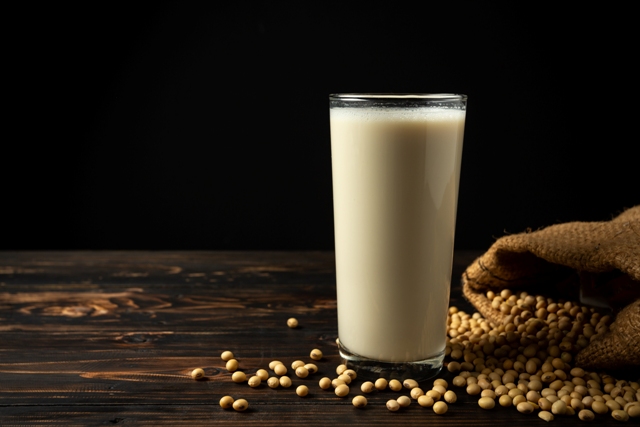
Source:
Jooyandeh, H., 2011. Soy products as healthy and functional foods. Middle-East Journal of Scientific Research, 7(1), pp.71-80.
KESIKA, P., SIVAMARUTHI, B.S. and CHAIYASUT, C., 2021. A review on the functional properties of fermented soymilk. Food Science and Technology.
Kundu, P., DhANKhAr, J. and ShArMA, A., 2018. Development of non dairy milk alternative using soymilk and almond milk. Current Research in Nutrition and Food Science Journal, 6(1), pp.203-210.
Mazumder, M.A.R. and Begum, A.A., 2016. Soy milk as source of nutrient for malnourished population of developing country: A review. Int J Adv Sci Tech Res, 6(5), pp.192-203.
Subrota, H., Shilpa, V., Brij, S., Vandna, K. and Surajit, M., 2013. Antioxidative activity and polyphenol content in fermented soy milk supplemented with WPC-70 by probiotic Lactobacilli. International Food Research Journal, 20(5), p.2125.
Zhu, Y.Y., Thakur, K., Feng, J.Y., Cai, J.S., Zhang, J.G., Hu, F. and Wei, Z.J., 2020. B-vitamin enriched fermented soymilk: A novel strategy for soy-based functional foods development. Trends in Food Science & Technology.
